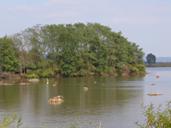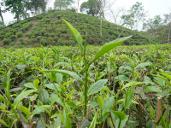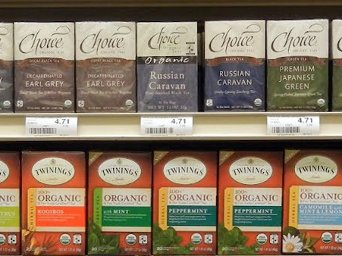Organic Tea
Wikipedia: Organic_foodLast Updated: Dec. 31, 2014
Browse Organic Teas
RateTea allows you to browse and search organic teas, filtering them by style/variety and country/region of origin.List Brands Selling Organic Tea

USDA
Organic Logo
RateTea is committed to sustainability, of which organic agriculture is an important part. We list teas that are organic with an icon:
Different organic certifying agencies
In the U.S., the most common certification is the USDA's organic certification, although California also has their own organic certification. The European Union has a unified organic standard, but individual European countries also have important certifications, especially those from France and Germany. Japan also has a standardized organic certification program. Organic certification is complex, at times controversial, and varies greatly among different certifying agencies. For further reading, check Wikipedia's page on organic certification. Because tea is certified both in countries of origin and countries of sale, all of these agencies are relevant to people interested in the topic of organic tea.Why buy organic tea? (or organic food in general)

Organic agriculture
protects waterways

Tea Garden
in Bangladesh
Environmental damage caused by tea production: Tea plants in commercial gardens require periodic fertilization due to nutrients lost as leaves are harvested. Heavy application of nitrogen fertilizers in tea fields can cause soil acidification and serious contamination of local water with nitrates.[2] In China, some tea planters use pesticides such as DDT which have serious ecological impacts, although in 2004 China's Ministry of Agriculture asked planters to reduce their use of a number of such pesticides.[3] Organic practices are thus important for tea as for many other agricultural commodities.
Toxic pesticides in tea: At least 13 pesticides are commonly used in tea production in India, and if residue from these pesticides is left in processed tea, it can be leached into the cup of tea when it is brewed. The rate of leaching varies greatly from one pesticide to another and can be small or negligible for some pesticides but significant for others.[4] There are records of pesticides being found in packed tea, including pesticides whose use is banned in Taiwan.[5]
Exercising caution with organic products:
Organic tea isn't an instant solution to problems in tea growing. Many farming practices can be certified as organic while still committing human-rights abuses or being damaging to the environment. Organic labeling and certification is sometimes associated with fair trade, but these two types of certification are separate and do not necessarily go together--and fair trade, like organic certification, also has its share of problems. Also, monoculture in crops and a lack of undisturbed natural ecosystems is a problem that is not solved by organic certification. Some approaches, such as biodynamic agriculture, involve setting aside a certain portion of land and leaving it as natural ecosystem in order to conserve biodiversity and provide other environmental benefits. These boxed tea bags are certified organic, but the packaging of the tea in individual tea bags and boxes uses more resources than the packing and shipping of loose-leaf tea.
These boxed tea bags are certified organic, but the packaging of the tea in individual tea bags and boxes uses more resources than the packing and shipping of loose-leaf tea.Other products may not be labeled or certified as organic but may be produced in a more sustainable way. For example, organic fertilizing schemes tend to be an improvement over synthetic fertilizers, but they can still contribute to nitrogen pollution in the same way as synthetic fertilizers. Permacultures of ancient tea trees, such as those in much of China's Yunnan province, can be preferable to even some organic-certified production.
Organic status can be faked: Occasionally, vendors will falsely label products as organic in order to fetch a higher price for the teas. We do not verify the organic certification status of every tea; in most cases we take information from labels, catalogs, and websites. When in doubt, please look up the certification on your own before trusting that a tea is actually certified as organic. In at least one case, pesticides illegal in the EU were found in tea labeled as "organic".[6]
Can one trust organic labeling in countries like China?
People often raise concerns about whether one can trust organic labeling of tea from China and other developing countries that have lax environmental standards and/or lax enforcement of agriculture and food laws. The organic food movement in China has been growing and there are standards for organic agriculture in place, but lax enforcement of these standards is a major obstacle to the integrity and success of organic farming there.[7] It's important to note that there are ways in which China's labeling and food laws are stricter than those in the U.S.; for example, China requires labeling of food containing genetically-modified organisms, whereas the U.S. does not.[7] This is not however an issue in tea production.References:
1. Sasha B. Kramer et. al., Reduced nitrate leaching and enhanced denitrifier activity and efficiency in organically fertilized soils, PNAS, Jan. 17, 2006.
2. K. OH, et. al., Environmental Problems From Tea Cultivation in Japan and a Control Measure Using Calcium Cyanamide, Pedosphere, Vol. 16, No. 6, Dec. 2006, pp. 770-777.
3. Jiang Yan, Pesticide regulations impair tea industry, China Daily, Apr. 13, 2004.
4. Shivani Jaggi et. al., Leaching of Pesticides in Tea Brew, Journal of Agricultural and Food Chemistry, Vol. 44, No. 11, 2001, pp. 5479–5483.
5. Pesticides found in tea packs at Palace Museum, China Daily, Updated: Nov. 17, 2009.
6. Pesticides found in organic tea, The Local (Sweden), Nov. 5, 2009.
7. Interest in organic food on the rise in China, LA Times, Aug. 08, 2009.
Further reading and resources:
Organic Agriculture | FAO (United Nations)

